Breaking Baz: Barbara Broccoli Is Perplexed About ‘Till’ And Oscars; Richard Hawley Musical Hit Heads To TV; David Hockney Lights Up London
- Oops!Something went wrong.Please try again later.
- Oops!Something went wrong.Please try again later.

Barbara Broccoli is perplexed as we grab a moment alone (well, not exactly alone alone; we were surrounded on all sides) at the swanky soirée Saturday for BAFTA Film Awards nominees at the National Gallery just off Trafalgar Square.
Far classier than the clumsy awards show the following night.
More from Deadline
Related Story
BAFTAs: ‘All Quiet On The Western Front’ Named Best Film, Takes 7 Prizes; Cate Blanchett Best Actress, Austin Butler Best Actor – Complete Winners List
Related Story
BAFTA Winners Group Photo Provokes Anger Over "Deeply Regressive" Lack Of Diversity
Related Story
'All Quiet On The Western Front' Wins BAFTA For Best Film Among Leading 7 Wins; DGA Winner 'Everything Everywhere All At Once' All But Shut Out
“They looked away,” Broccoli says of the Academy of Motion Picture Arts and Sciences voters who flat-out denied Chinonye Chukwu’s movie Till movie any Oscar nominations.
They looked away from Danielle Deadwyler’s poignant portrayal of Mamie Till-Mobley, the mother of Emmett Till who was tortured to death in Mississippi on August 28, 1955.
They looked away from Chukwu’s exploration of a mother’s love. You see, that’s what Till is about. You don’t see the vicious lynching. The movie’s about Mamie Till-Mobley’s reaction to her son’s killing, which, for me, is all the more eloquent.
The president of the United States, however, “refused to look away,“ says Broccoli, referring to Joe Biden’s decision to host a screening at the White House last week. “I was there and it was extraordinary because he understood what Till represents. And ,you know, it’s part of history now because Biden saw it,” she tells me at the National Gallery.
Broccoli salutes BAFTA for recognizing Deadwyler with a best actress nomination. ”They got it,” she says.
Although BAFTA does not get away that easily. There was zero diversity on Sunday night. The awards are absolutely no reflection of the world we live in.
The keeper of the 007 franchise bit her lip when I ask whether she found it a bit odd that the Oscars simply ignored Till. She shakes her head. There’s a conversation to be had, she says. ”A quiet conversation,” with me, “when the season’s over,” she adds.
I put her on the spot the following day when I ask her on video the same question. She chooses her words carefully. BAFTA got it, she explains again, noting Deadwyler’s nomination and Chukwu’s appearance on the BAFTA long list. “BAFTA has instigated change” and she hears that there are conversations about “change” ongoing at the Academy. Changes amounting to what? Flummoxed, we both shake our heads.
Broccoli is a producer of Till along with Whoopi Goldberg and others. “I’m passionate about this film. More than anything I just want it to be seen,” she implores.
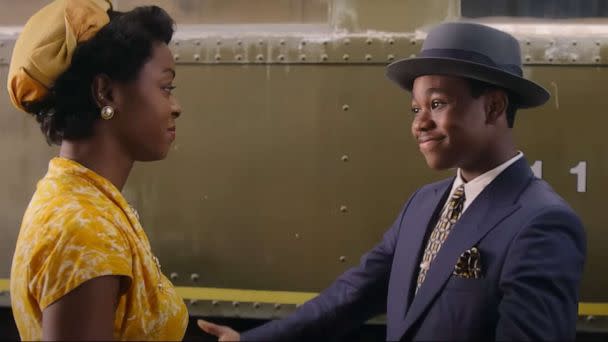
This awards season is a quandary for Broccoli because back in 2014 she chose Andrea Riseborough to star with Damian Lewis in filmmaker Corinna McFarlane’s intense psychological drama The Silent Storm and three years later she championed Riseborough again, this time for the film Nancy.
Whatever Broccoli thinks about Riseborough’s best actress nomination for the film To Leslie, she’s keeping it to herself.
I can’t deny that I feel for Riseborough. She’s a sublime screen and stage artist and I am fan of her work.
But the atmosphere is such that she stayed away from the BAFTA festivities. “Everyone’s very tense” when “Andrea’s name is mentioned,” an industry executive tells me.
There’s a narrative out there that Riseborough “stole” Deadwyler’s Oscar slot.
This talk of “slots” is a crock. ”There are no slots. It’s really about whether people have seen the movie. I find it maddening because the idea that there are slots is kind of bizarre,” a prominent director of my acquaintance argues.
What happens, the filmmaker explains, is that Deadwyler’s performance was rightly triumphed by critics and the punditry. “And then it becomes a thing. Like, she’s on her way to a nomination. Like you, I thought she would be nominated because it’s an outstanding performance. But the voters didn’t watch it. That’s the only explanation. The idea that Riseborough somehow bumped her off the list is nonsense. We don’t know who was number six or number seven! Voters didn’t see it. Rather, not enough voters saw it,” my artist acquaintance suggests.
“Look at All Quiet on the Western Front, for instance. When you think about it you shouldn’t be surprised it did so well at the BAFTAs because Netflix worked away behind the scenes and made sure the guilds saw it. Then they moved up a notch and made sure the wider industry saw it. They screened it and screened it. They had armies of people making sure it was seen.
“Ask yourself this though: did the Till people do the same? And the answer is, obviously not,” the person of my acquaintance says.
Perhaps.
The awards industrial complex is mad because a bare-bones campaign with little money to spend catapulted Riseborough to Academy Award contention.
There’s something else though: unconscious bias.
A member of both BAFTA and the Academy admits, and this person is a Caucasian, that when they see that a title is a Black-themed movie, they sometimes look away. There’s an automatic presumption that it’s going to be depressing, or whatever, so you look at something else, says this old acquaintance; not the aforementioned person of my acquaintance, but another one.
They may go back to the movie they passed on. Only if there’s time.
I let my acquaintance carry on talking without interruption. I wasn’t shocked, sadly. I have had many such conversations before and I choose not to condemn my acquaintance because at least they are being honest.
Is their behaviour laziness? Is it racism? Oh God, I don’t know.
I’m not so quick to charge someone as a racist because on occasion I look away, too.
However, I don’t put movies into categories of Black films and white films.
I gravitate towards what I perceive to be more appealing films first. Then I go back to the ones I looked away from.
I sort of have to see everything. For starters it’s my job, plus I sit on various awards panels. Once in a while there’s a gem to be found in the ones I initially avoided. And it’s good to be pleasantly surprised.
We are human beings; we all have biases. That’s not to excuse those who looked away from Till under the mistaken impression they’d find it “depressing.”
Nor should people make the mistake of thinking that I am predisposed to liking Till because it’s a “Black” film.
Not true. I am, however, predisposed to movies that tell a story that holds me, grabs me by the throat and says: watch me. Till does that.
By the way, I am also predisposed to many genres, from kick-ass action thrillers through to cops and robbers, spy movies, political movies, romantic movies, sports movies; films by exciting emerging filmmakers; movies featuring newcomers I can’t look away from. There’s a heap of stuff that I love (and loath) but I don’t sit here going, well I’ll see a Black one tonight and a white one tomorrow.
Spike Lee calls the awards brouhaha “a cancer.” “You know what I’m talking about,” he tells me at a reception following an event at the British Film Institute in London, where the director was honored with a BFI Fellowship, the organization’s highest award.

“It’s a cancer the way sports and film people chase after awards,” he says.
I push him to explain. He looks up at me through those large-frame specs he favours and offers ”where the ultimate goal is to win an award versus what’s best for the film. What’s best for the role that you’re playing. As simple as that.”
I roll my eyes and say that it’s not as simple as that, Spike! What and who are you referring to? What is this cancer?
“I’m not naming no names. Come on, you’ve known me a long time,” he says as he saunters away having lobbed his grenade for the night.
Not helpful, really, Spike, I say to the back of his purple suit.
Spike, Spike, Spike. I love his movies. And yeah, I have known him a bloody long time.
I laugh now, but he once raged at me in the lobby of Shutters on the Beach, three decades ago when it was all shiny and new, for having the audacity to be married to a woman who isn’t Black — I told him to f*ck right off.
He was being ridiculously provocative, as if he was daring me to do the right thing and tell him to f*ck right off.
Actually, I rather enjoy a rumble with a Spike Lee or say a James Gray or a Mike Leigh. I prefer to see people as they are, stripped of all that entertainment industry bullsh*t.
Spike’s been “nice” to me ever since the thing about my wife.
I guess not enough people tell him to f*ck right off. Right?
So yes, Barbara, we have a lot to discuss when the season’s over.
‘SKY’S EDGE’ SOARS
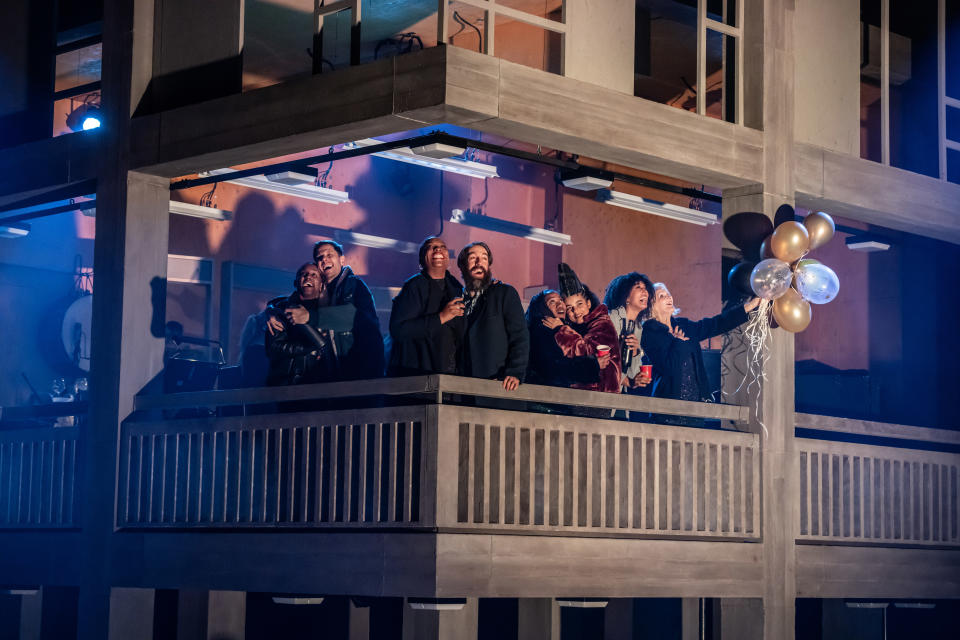
StudioCanal’s RED Production Company is in the early stages of developing a four-part drama based on the award-winning musical Standing at the Sky’s Edge by playwright Chris Bush featuring songs from the catalogue of Richard Hawley.
The theater show opened at Sheffield’s Crucible Theatre in south Yorkshire in 2019 having been commissioned by Sheffield Theatres and Rupert Lord’s Various Productions. That’s when RED took out an option on the show.
It was revived in Sheffield late last year and it’s now enjoying a limited run at the National Theatre in London.
Bush sets their story in Park Hill, a radical, Brutalist apartment block built over six decades ago for tenants who lived in Sheffield’s slums, with dozens often having to share outdoor toilet facilities. Here was a great post-war opportunity: a place with your own front door and your own loo!
Bush’s tale settles on the three families that occupy one particular flat over a period of 60 years and how they interact with other residents.
I have a fond memory of covering a rehearsal of Standing at the Sky’s Edge in London, before it headed up north for it’s initial Sheffield outing.
I knew some of Hawley’s songs, but as I watched Robert Hastie, the show’s director and Sheffield Theatres’ artistic chief, work with choreographer Lynne Page and members of the cast, I realised that Bush’s book had given Hawley’s songs a whole new meaning. In fact some of the numbers are like mini plays in themselves.
And over the years those performances have gotten deeper. To watch Faith Omole, Rachael Wooding and Alex Young — three of the main leads I saw that day at rehearsal, and again in Sheffield, twice, and now at the National — is to see three artists excel. From now on I shall forever associate Hawley’s song “Coles Corner” with Omole. Of course, others will sing it because this show will have a long life on another stage following its limited run at the National.
The National’s a perfect home for the show because Park Hill’s slabs of concrete, skillfully realised by designer Ben Stones, blend seamlessly with the NT’s similar style.
Standing at the Sky’s Edge is like Pennies From Heaven meets Our Friends from the North on a Billy Elliot picket line. In fact, it’s the best British musical since Billy Elliot opened at the Victoria Palace 18 years ago.
It gets right to the heart of who we are — good and bad — in England, then and now.
Chloe Dunbar, RED Production’s head of development, confirms that Bush is expanding their book to flesh the story out.Dominic Leclerc,a director on Sex Education,will work with Bush on the script,says Dunbar,and he will direct.
Dunbar didn’t rule out the possibility of some filming actually taking place in the real Park Hill estate, now designated as a listed building of historical importance.
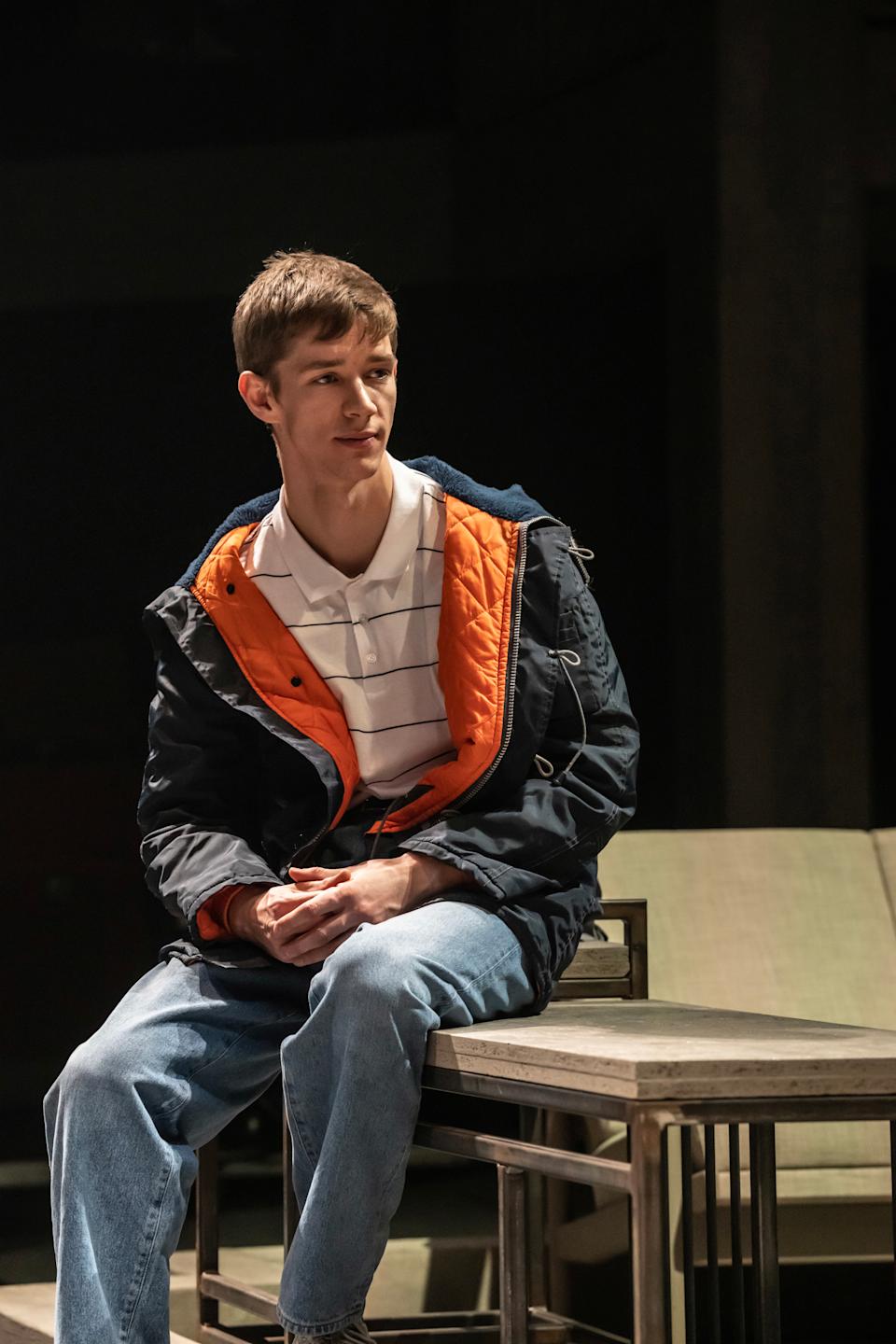
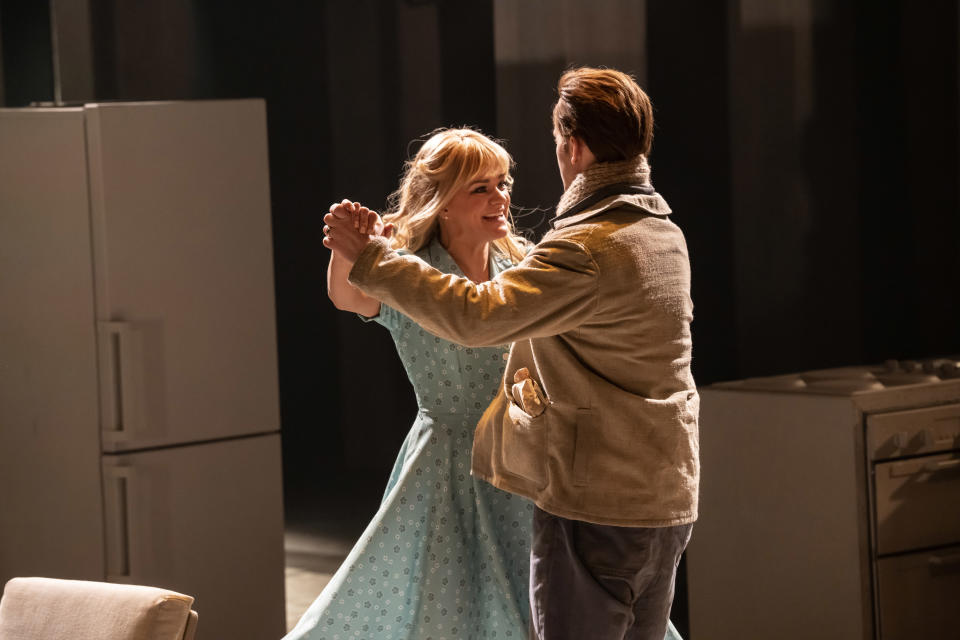
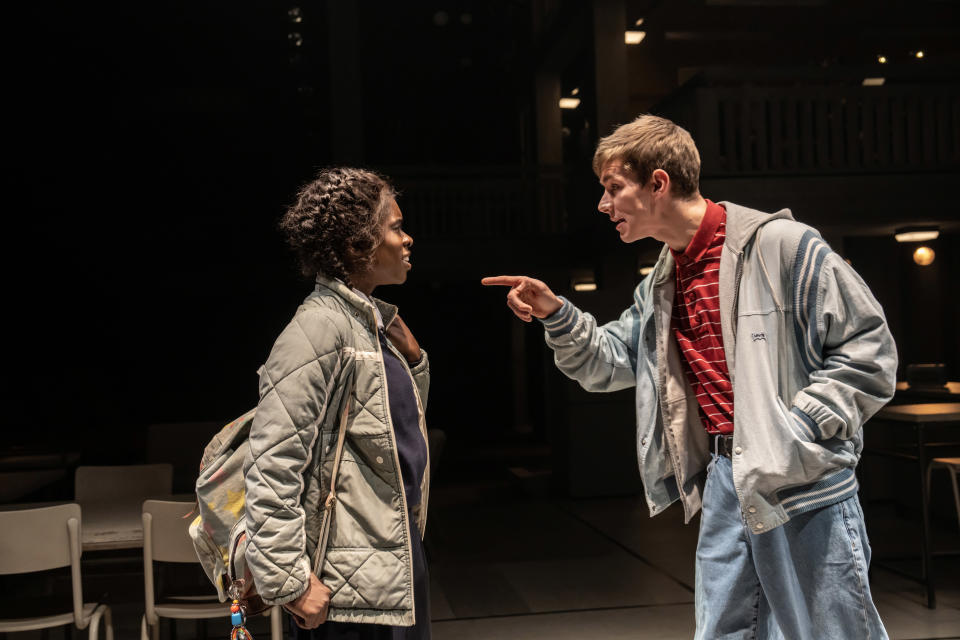

Howley lives locally, as does Bush, and is hailed as the godfather of the Sheffield music scene. Numbers from Hawley’s albums will feature in the TV production, and there’s a hint that he may write some new songs as well.
The show has yet to be commissioned by any of the networks. Commissioning execs will be bopping in and out of the NT to decide whether they will be the one to give the four-parter the green light.
No casting as of yet but certainly Omole, Wooding, Young, along with Robert Lonsdale, Maimuna Memon, Alastair Natkiel, Rachael Louise Miller, Baker Mukasa and Samuel Jordan — in a stunning London theater debut — are worthy of reaching for the sky on television.
HOCKNEY’S ART SOOTHES

My senses were in need of soothing after three nights of back-to back-partying over the long BAFTA weekend. I rolled up at my home after 6 a.m. one morning. By the way, I should point out that I don’t do booze when I’m out on the town for work. My head was hurting though.
For some reason I kept hearing the voice of TV personality Alison Hammond in my head going ”How ya doin’, Babes?”
Then I remembered that she co-hosted the BAFTAs with Richard E. Grant.
What to do? I had an invitation in my back pocket to attend a preview of David Hockney: Bigger & Closer (not smaller & further away) over at a new installation and theater space called Lightroom in the snazzy new development that is now King’s Cross.
It’s the latest new building from Nicholas Hytner and Nick Starr, the two Nicks who ran the National Theatre for over a decade. They built The Bridge in the shadow of Tower Bridge. Now, with Richard Slaney, managing director at 59 Productions, they have created the multi-purpose Lightroom, a space that can shape-shift any which way you fancy.
Hockney’s show is the inaugural production.
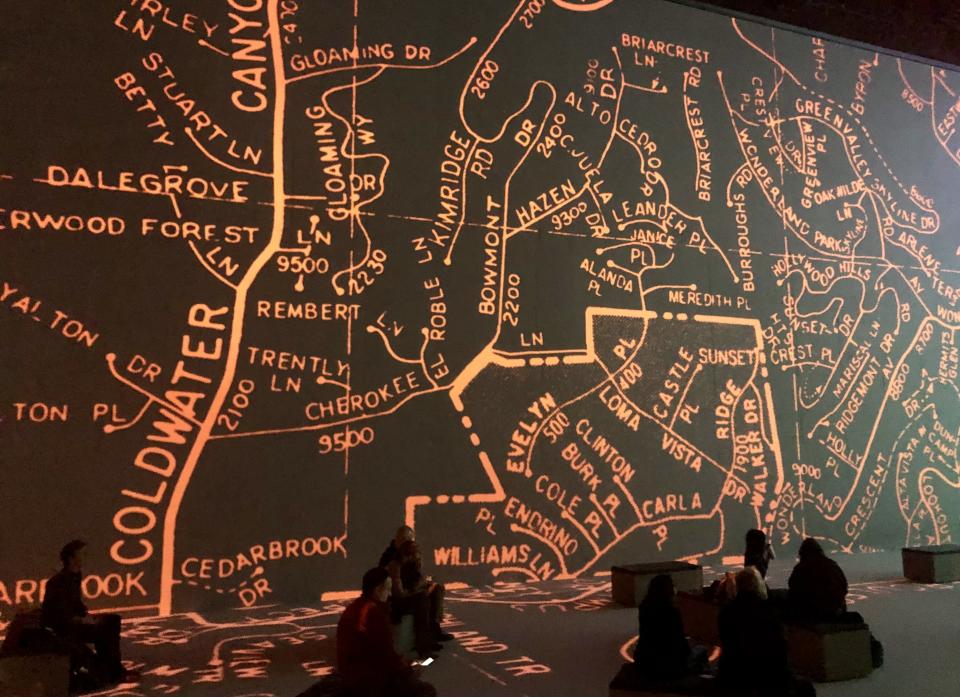
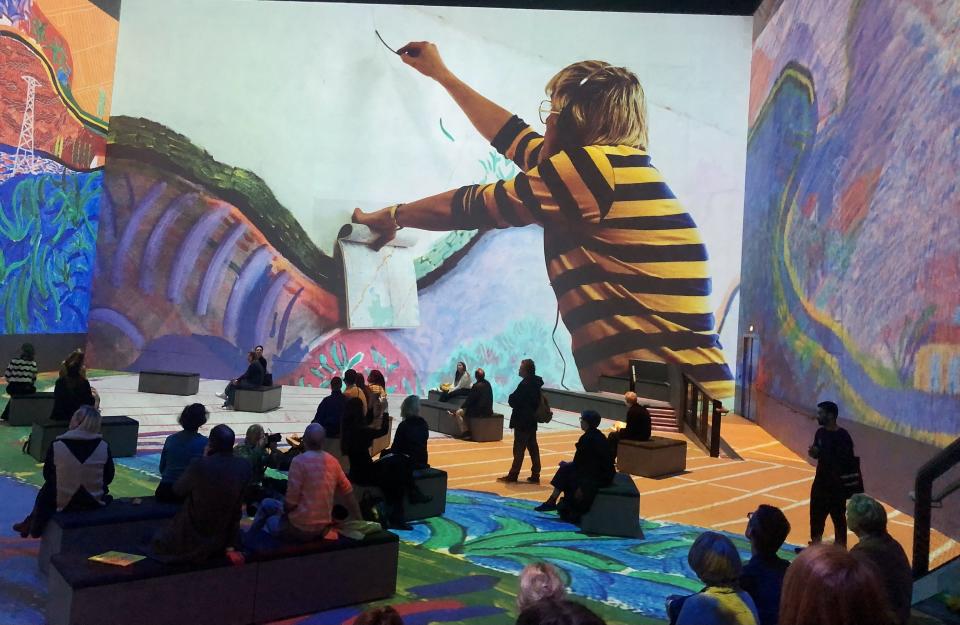

The place is a marvel. I did as instructed and went down a few steps, followed a passage and was somewhat discombobulated as I came to what looked like a wall. But it was an illusion of light and I carried on walking down more steps and … the show was already running.
Bigger & Closer is a multi-dimensional digital experience that projects Hockney’s oeuvre on three main walls like a mammoth triptych; it beams around parts of a fourth wall that features the entrance, stairway and a viewing gallery way up in the gods.
Hockney and his team collaborated with Mark Grimmer, the show’s director and co-founder of 59 Productions, to assemble his work, dividing it into sections that explore perspective; his incredible designs for opera and ballets; and a fabulous segment entitled “roads and paths” that explore how he found art in Los Angeles highways. Hockney narrates the entire 54-minute show and he relates how the “straight lines and cubes” of Santa Monica fascinated him when he lived there upon arriving from the UK in the 1960s. “It was only later,” he continues, “when I went to live in the hills that wiggly lines appeared in Los Angeles … so suddenly squiggly lines started appearing in the paintings.”
There’s a sequence where he fixes a multi-lens camera contraption to a car as he takes a spin across the San Gabriel Mountains as Wagner booms out of the car’s sound system.
I like his comment that “everything in L.A. Is meant to be read at 25 miles an hour. Because everybody’s driving.”
As Hytner noted when we spoke, Hockney’s “always been on the cutting edge of technology so what you get is a look at the world through his eyes and through his art … his genius is that he’s so perceptive, insightful and intelligent that he can make his ideas accessible to an intelligent child. So nothing is complicated, nothing is daunting, but your mind keeps getting blown as he tells you what to look at.”
There are the paintings and photography and video of landscape — Yorkshire, Normandy, where he currently lives, Los Angeles highways and byways — and yes, those swimming pools.
As Hytner says, “it’s an amazing sensory journey.“ So soothing, like balm for the soul.

Starr tells me that the show “starts when you arrive.” There’s scattered seating and you just sit. Stand if you want to or squat or well, whatever, as long as it’s decent. You just lap it up. You can watch one wall or spin around as the footage zips around the auditorium until you reach the point where you started 54 minutes earlier. Because of the staggered times throughout the day people will come and go. Starr explains the every 15 minutes, 75 people will amble in.
I stayed well over my allotted time because my body required restoration. My head needed to be fed with culture that’s fun and invigorating.
I found it at Lightroom a mere six-minute walk from King’s Cross/St Pancras rail and tube stations.
BAZ 1 AND ELVIS
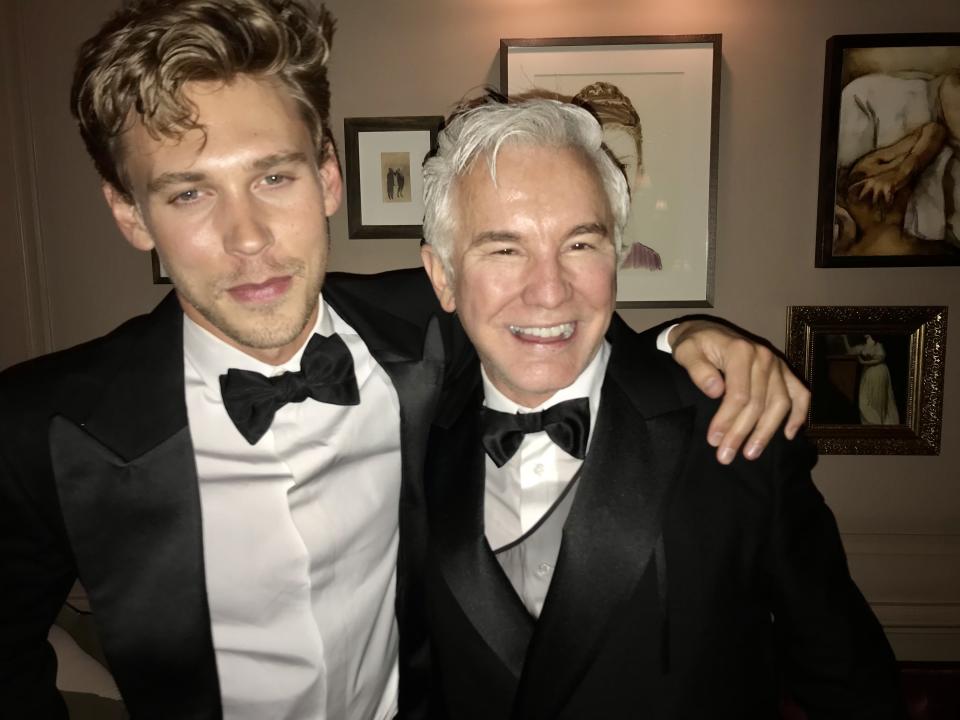
Had a very jolly time sitting next to Priya Dogra, Warner Bros Discovery EMEA president and managing director, at the Chanel/Charles Finch pre BAFTA cocktails, dinner and dance at the 5 Hertford Place private members cub in Mayfair.
We bonded after it fell to us to “look after” a most engaging person (no names) who was simply having too good a time. It was a party for heaven’s sake.
Dogra graciously invited me to join her, creatives and execs at Kettner’s on Sunday night. “Baz will be there,” Dogra teased, referring to Baz Lurhmann, who along with my colleague Damon Wise helped coin the name of this column.
Baz was there and I paid homage to him. I bowed and hailed him as Baz 1. He greeted me as Baz 1 too. “Am I still Baz 1?” he asks.
I clarify that yes, he’s Baz 1 while his movie Elvis is in play and that I am happy to continue as Baz 2.
Can we both be Baz 1 at the same time, he wonders. No, I say, and remind him of the original articles of intent that he is Baz 1 while he has a film out. I become Baz 1 when the film’s had its release and awards-season run.
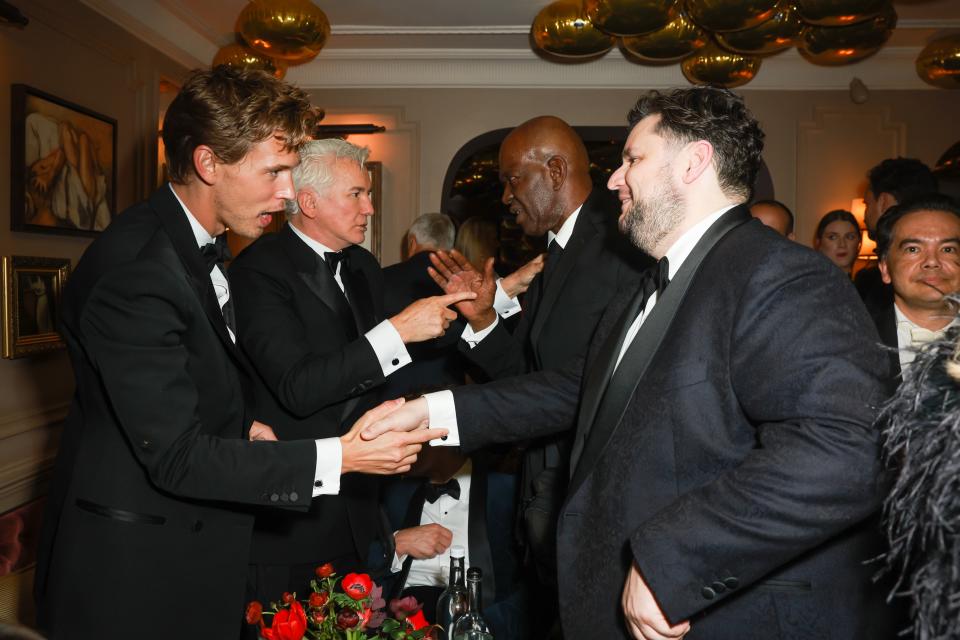
Poor Austin Butler, the best actor BAFTA victor for his sparkling turn as the king of rock. He looked a little shook up as he tried to follow the Baz succession convo. My colleague Joe Utichi was equally baffled.
A few hours later at some ungodly hour I bump into Dogra at the Netflix party which is now in full swing at the Chiltern Firehouse. We both chuckle because our “most engaging person” had had a good night.
Best of Deadline
Oscars: Every Best Supporting Actor Oscar Winner Back To 1937
Grammy Best New Artist Winners Through The Years – Photo Gallery
Sign up for Deadline's Newsletter. For the latest news, follow us on Facebook, Twitter, and Instagram.

